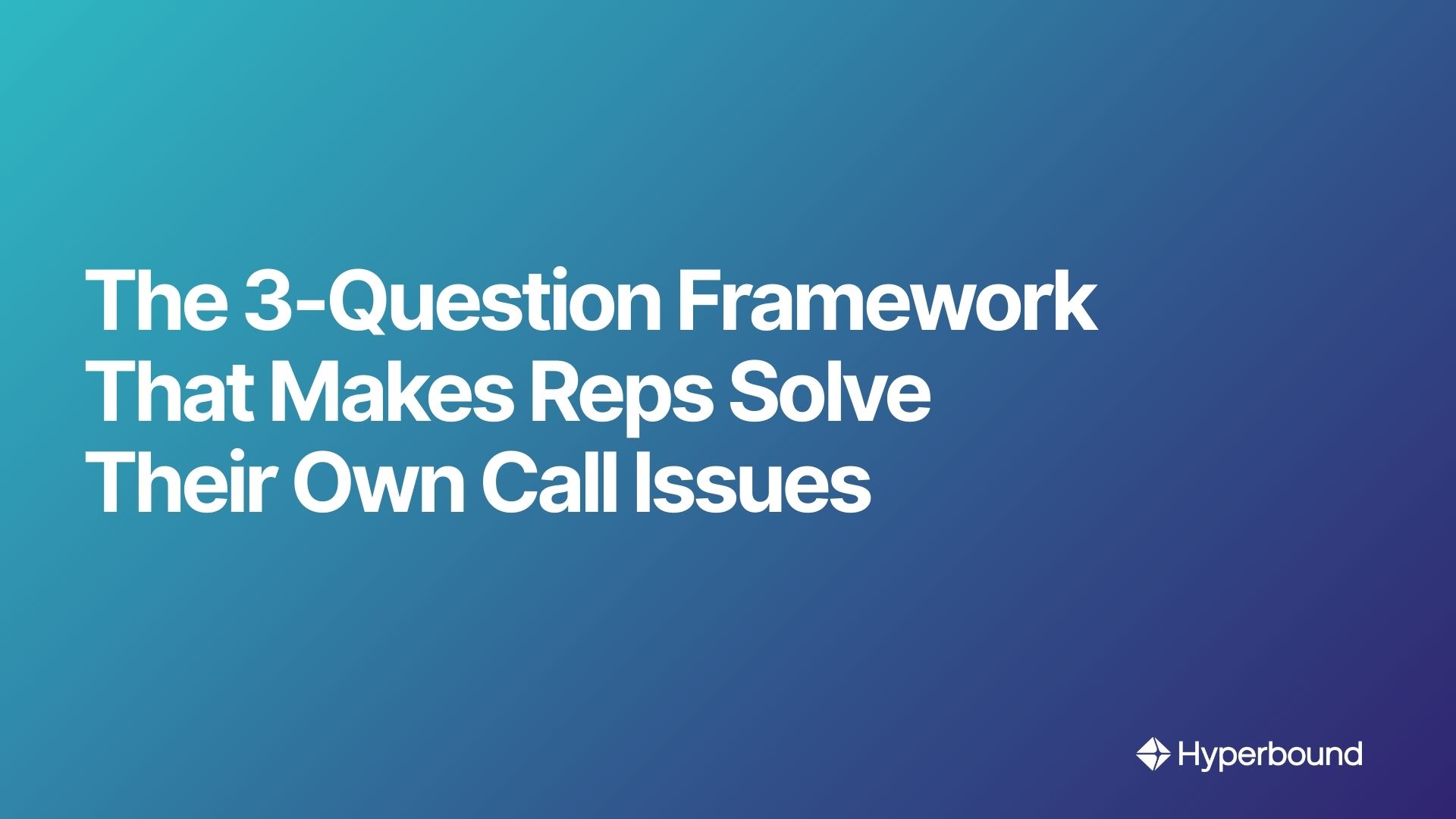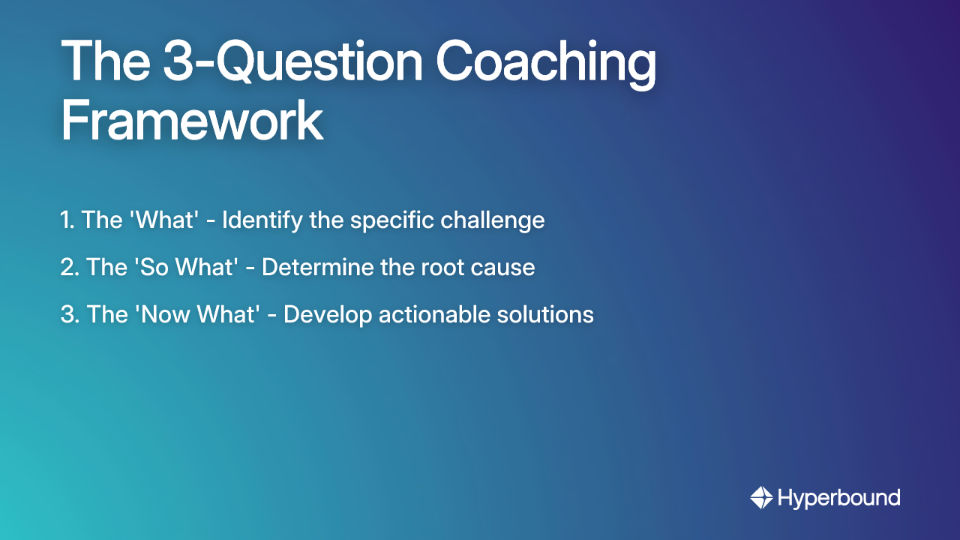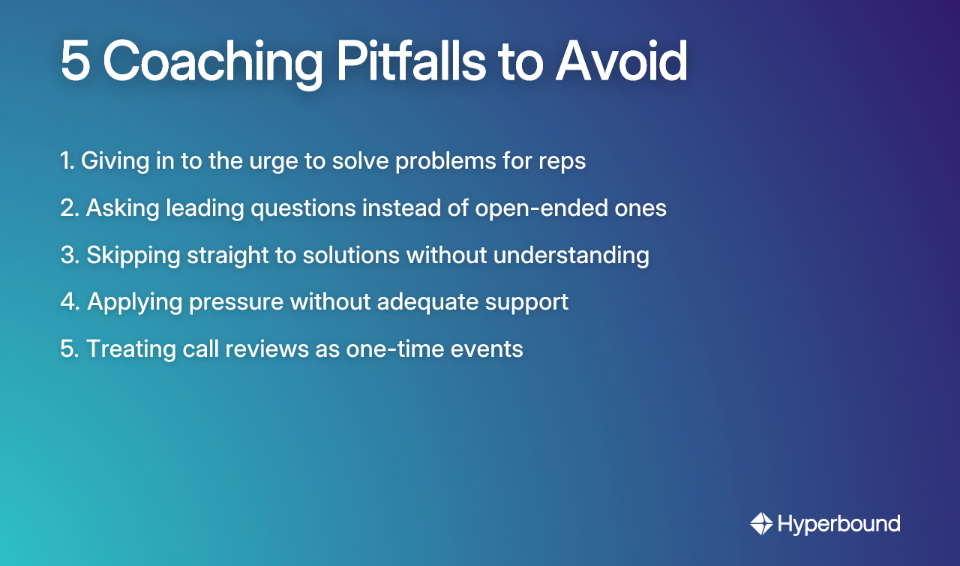
You've been there before. You spend hours reviewing call recordings, meticulously noting every mistake your reps make. You craft detailed feedback, expecting dramatic improvement, only to watch them make the same mistakes on their very next call. It's a frustrating, time-consuming, and—in the age of AI—an inefficient way to coach.
What you're witnessing is what one sales leader on Reddit aptly called "I-don't-give-a-sh*t-itis"—that glazed-over look reps get when receiving feedback they didn't ask for and don't feel connected to.
The problem isn't your dedication to call reviews. It's your approach.
Why Traditional Call Reviews Fail
When you tell a rep "don't do A, do B instead," you're giving them a fish instead of teaching them how to fish. This directive approach creates three critical problems:
- Zero ownership: When you provide the solution, the rep has no stake in it
- Limited learning: The rep doesn't develop critical thinking skills necessary for quota roles
- Manager dependency: You become the bottleneck for all problem-solving
As one experienced sales manager put it, you need to "stop listening to calls and start listening to your team." The most valuable insights often come not from what happened on the call, but from how your rep interpreted what happened.
The Mindset Shift: From Problem-Solver to Coach
The solution isn't to abandon call reviews but to transform them through guided self-discovery. Instead of being the all-knowing problem-solver, your job is to be a coach who asks the right questions at the right time.
This approach isn't just feel-good management theory—it's backed by results. Reps who discover their own solutions are significantly more likely to implement them. And as one sales leader noted, this questioning approach may cause reps to "come up with answer C, which neither of you have thought of before. That's how we build strong multidimensional teams."
The 3-Question Framework
After synthesizing advice from top sales coaches and pulling insights from real sales managers' experiences, I've developed a simple but powerful 3-question framework that transforms ordinary call reviews into powerful coaching sessions.

Question 1: The "What" — "What specific challenge are you facing?"
This first question forces the rep to articulate the problem in their own words, moving from a vague feeling of "the call went bad" to a specific issue they can address.
Why it works: It immediately puts the rep in an active role rather than a passive one. They're no longer receiving feedback; they're analyzing their own performance.
How to use it: Ask this open-ended question and then listen carefully. If they give a vague answer like "I'm not closing enough deals," push for specificity:
- "Can you describe the exact moment in the call where you felt things went off track?"
- "What specific objection or situation are you struggling with most?"
Question 2: The "So What" — "What do you believe is the root cause, and what have you tried?"
This second question is the most critical. It pushes the rep beyond identifying symptoms to diagnosing causes. It also acknowledges their agency by asking what solutions they've already attempted.
Why it works: This question bridges the gap between identifying a problem and understanding why it's a problem. It respects the rep's intelligence while pushing them to think more deeply.
How to use it: After they've identified a specific challenge, ask this two-part question and give them time to think. If they struggle:
- "What assumptions might you be making about this situation?"
- "Why do you think that approach didn't work?"
- "What patterns have you noticed across calls where this issue occurs?" (This is where AI call analysis can be a superpower, automatically surfacing trends you might miss).
Real-world example: A salesguy struggling with price objections might initially say, "Prospects always think our product is too expensive." When asked Question 2, they might realize, "I think I'm bringing up pricing too early, before I've established enough value. I've tried discounting, but that just reduces the perceived value further."
Question 3: The "Now What" — "What solutions or alternative approaches can you think of?"
This final question transfers ownership of the solution to the rep. It empowers them to think creatively and develop actionable strategies they're actually invested in implementing.
Why it works: People rarely argue with their own conclusions. When a rep develops their own solution, they have internal commitment to follow through.
How to use it: Encourage brainstorming without judgment. If they get stuck, try:
- "What would you advise a colleague to do in this situation?"
- "What's one small thing you could try differently on your next call?"
- "How might you approach this differently using the X/Y technique to maintain confidence?"
- "Where can you practice this new approach before using it with a real customer?"
After they've identified potential solutions, you can solidify the commitment. Suggesting reps use an AI Sales Roleplay platform to practice their new strategy in a safe environment before a live call builds confidence and muscle memory. Then, follow up with: "Let's review a practice session, and then you can add me to one of your calls next week so I can hear it in action!" This creates accountability while offering an opportunity for live coaching.
Handling Resistance: When Reps Say "I Don't Know"
The most challenging moment in this framework is when a rep responds with "I don't know." This is a critical juncture—don't let them off the hook. As one blunt but effective Reddit commenter advised: "Keep asking them until your rep spits out the answer."
Here's how to push through this resistance:
- Normalize the struggle: "It's normal not to have an immediate answer. Let's think through this together."
- Break it down: Use funnel questioning to move from broad to specific:
- "Overall, what parts of the call felt strongest to you?"
- "Which part felt most uncomfortable?"
- "When the prospect said X, what went through your mind?"
- Change perspective: "If you were the customer, how would you have felt at that moment in the call?"
Remember, time is money in sales. The investment you make in guiding reps through this process pays dividends when they learn to solve their own problems without running to you for every challenge.

Putting the Framework Into Action: A Real Scenario
Let's see how this plays out in a realistic coaching conversation:
Manager: "You mentioned you wanted to review this call where the prospect went cold after you discussed pricing. From your perspective, what specific challenge did you face?"
Rep: "They seemed really interested until I gave the price, then suddenly they needed to 'think about it' and haven't responded to follow-ups."
Manager: "I see. What do you believe is the root cause of that reaction, and what have you tried to address similar situations?"
Rep: "I don't know... I guess they just didn't have budget."
Manager: "That's possible. But let's think deeper. What was the conversation like before you shared pricing? Had you established clear value aligned with their specific needs?"
Rep: "Well, I did cover our features, but maybe I didn't connect them strongly enough to the pain points they mentioned in discovery. I've tried offering discounts in the past, but that doesn't seem to help much."
Manager: "That's an insightful observation. What solutions or alternative approaches can you think of for your next call?"
Rep: "I think I need to build a stronger value case before introducing price. Maybe I should recap the specific problems they've shared and explicitly connect our solution to each one, calculating potential ROI where possible."
Manager: "That sounds like a solid approach. Let's refine that strategy together, and I'll join one of your actual meetings next week to see how it works in practice."
Common Pitfalls to Avoid

Even with this framework, there are several ways managers can undermine their coaching efforts:
- Giving in to the urge to solve: When a rep struggles, it's tempting to just tell them what to do. Resist this impulse! Short-term, it seems efficient, but long-term, it creates dependency.
- Asking leading questions: "Don't you think you should have done X?" This isn't true questioning; it's your solution in disguise.
- Skipping to solutions: All three questions matter. Don't jump straight to "what would you do differently?" without understanding the specific challenge and root cause.
- Applying pressure without support: Challenging reps is important, but remember to balance criticism with encouragement: "You did great with A and B, but when C was shaky, it made the customer unsure."
- Treating call review as a one-time event: The best coaching happens in a continuous cycle: review, practice, implement, and repeat. Without a way to practice effectively and at scale—like through on-demand AI roleplays—reps often fail to build the muscle memory needed for the new behavior to stick.
Building an Army of Problem-Solvers
By consistently applying this 3-question framework, you transform your role from the team's problem-solver to their performance coach. Over time, your reps develop:
- Greater self-awareness about their performance
- Stronger critical thinking skills for sales situations
- Increased confidence in their ability to adapt
- Deeper ownership of their results
This isn't just better for them—it's better for you. Instead of being bombarded with questions and problems all day, you're building a team of self-sufficient sales professionals who can navigate their own challenges. And with modern tools to help you scale this coaching culture, you can get there faster than ever.
The next time a rep comes to you with a problem from a call, resist the urge to offer an immediate solution. Instead, ask: "What specific challenge are you facing? What do you believe is the root cause? What solutions can you think of?"
Then watch as they discover the answer that was within them all along—and actually implement it.
That's how you build a truly multidimensional team capable of hitting targets quarter after quarter.
Remember, the goal of hands-on training isn't to create reps who need you—it's to create reps who can think like you. This 3-question framework is your path to getting there.
Frequently Asked Questions
What is the 3-question coaching framework for call reviews?
The 3-question coaching framework is a method designed to guide sales reps through self-discovery during call reviews by asking: 1) "What specific challenge are you facing?" (The 'What'), 2) "What do you believe is the root cause?" (The 'So What'), and 3) "What solutions can you think of?" (The 'Now What'). This Socratic approach shifts the manager's role from a problem-solver to a coach, empowering the rep to identify, analyze, and solve their own challenges, which leads to greater ownership and more effective learning.
Why do traditional call reviews often fail?
Traditional call reviews often fail because they are directive, with managers simply telling reps what they did wrong and what to do differently. This top-down approach creates a lack of ownership from the rep, limits their development of critical thinking skills, and makes them dependent on the manager for all problem-solving. This can lead to reps who are disengaged from the feedback and unlikely to change their behavior.
How should I handle a sales rep who says "I don't know" during coaching?
When a sales rep says "I don't know," it is crucial not to give them the answer, as this undermines the self-discovery process. Instead, you should guide them by normalizing the struggle ("That's okay, let's think it through"), breaking the problem down with more specific questions ("Which part of the call felt most uncomfortable?"), or asking them to see the situation from the customer's perspective. The key is to keep them engaged in the critical thinking process.
What are the main benefits of using a self-discovery coaching model?
The primary benefits of a self-discovery coaching model are increased rep ownership of solutions, the development of critical thinking skills, and reduced dependency on managers. Because reps formulate their own conclusions, they are far more committed to implementing them. Over time, this builds a more self-sufficient, confident, and adaptable sales team capable of solving problems independently.
How can I ensure the new behaviors from coaching actually stick?
To ensure new behaviors stick, coaching must be followed by consistent practice and reinforcement. The cycle of review, practice, implement, and repeat is essential for building the muscle memory required for lasting change. After a rep identifies a new approach, they need a safe space to rehearse it. Using tools like AI sales role-playing platforms allows them to build confidence and refine their technique before using it in live customer interactions.
How does AI help with this coaching process?
AI can significantly enhance the coaching process in two key ways: by automatically analyzing call data to identify patterns for discussion, and by providing on-demand, scalable role-playing platforms for reps to practice new skills. AI call analysis can surface issues across multiple calls, providing concrete data for the "So What" phase of coaching. Afterward, AI role-play tools provide a safe, consistent environment for reps to practice their new strategies, building confidence for real-world success.

Book a demo with Hyperbound
.png)













